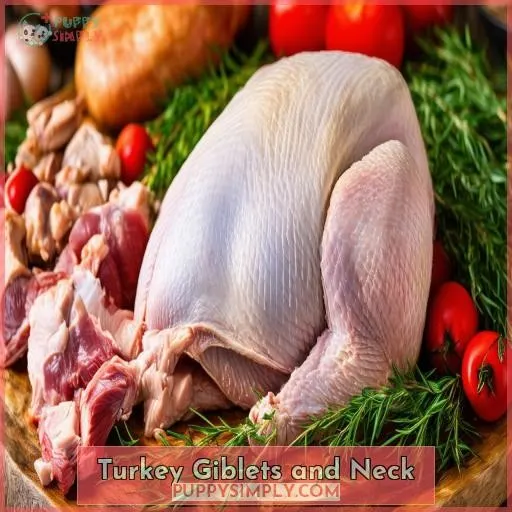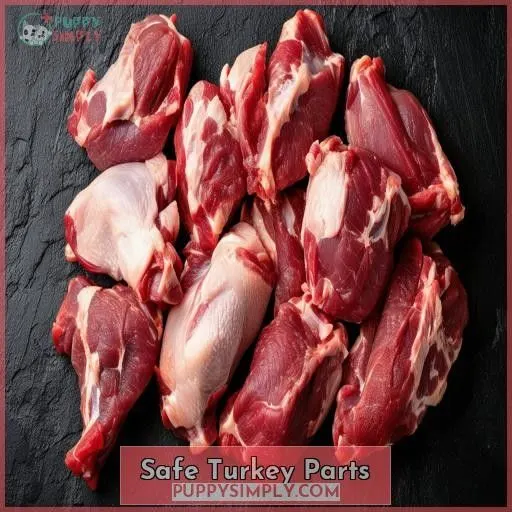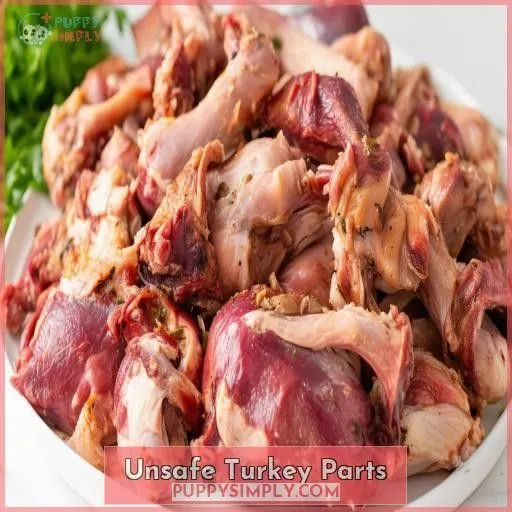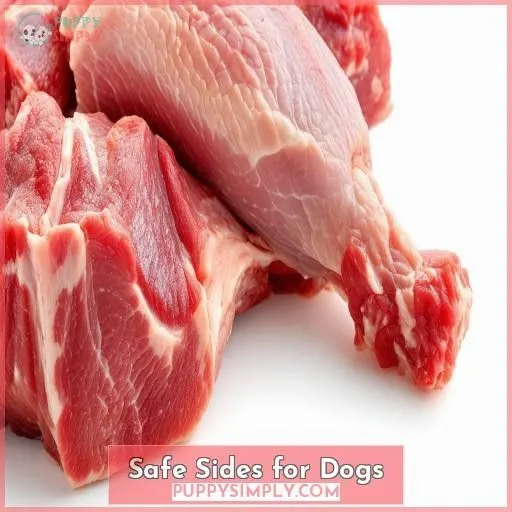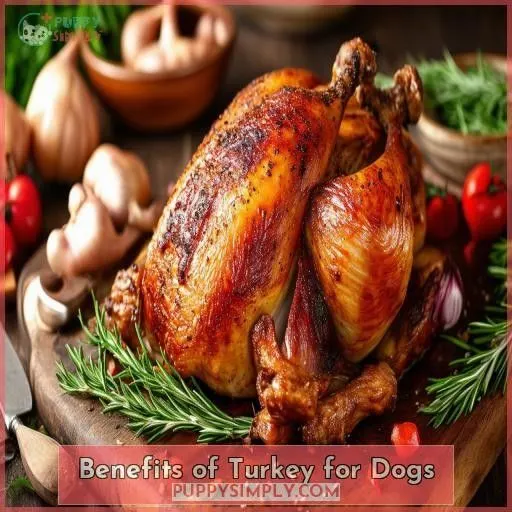This site is supported by our readers. We may earn a commission, at no cost to you, if you purchase through links.
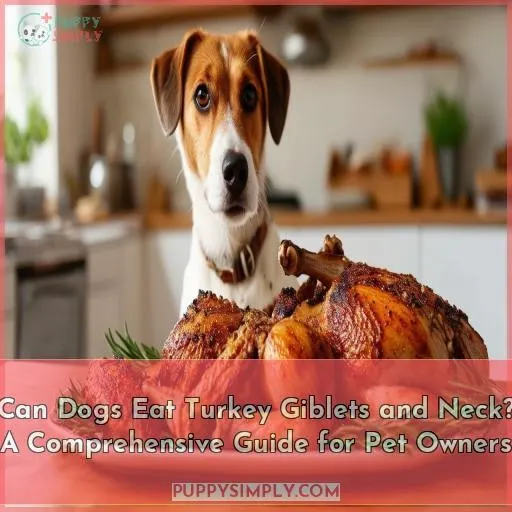
Thoroughly boil and finely chop the giblets, removing any bones or tough bits. It’s best to avoid feeding the neck entirely.
Consider substituting chicken giblets for easier digestion. Follow these guidelines, and your pup can enjoy the nutritional benefits of turkey giblets and neck safely.
Want to make sure your furry friend gets the most out of their holiday feast? Keep reading for a complete guide.
Table Of Contents
Key Takeaways
- Turkey giblets and neck can be a nutritious treat for your pup, but watch out for that choking hazard! Boil ’em up, chop ’em fine, and skip the neck altogether to keep your furry friend safe and satisfied.
- White meat, dark meat, and properly prepared giblets? All fair game for Fido’s feast! Just remember to ditch the skin, bones, and any questionable seasonings that could spell trouble for your pup’s tummy.
- Sweet potatoes, veggies, pumpkin, oh my! These nutritious sides are the perfect complement to your dog’s turkey-day spread. And don’t forget the peanut butter – as long as it’s xylitol-free, it’s a tasty way to round out the meal.
- Turkey’s not just delicious – it’s packed with protein, vitamins, and minerals that’ll keep your pup’s tail wagging all season long. But when in doubt, always check with your vet to ensure your holiday feast is safe and healthy for your furry friend.
Can Dogs Eat Turkey Giblets and Neck?
Yes, dogs can safely eat turkey giblets and neck meat. However, it’s significant to verify that the giblets and neck are fully cooked and not seasoned with any harmful ingredients before feeding them to your pet.
Turkey Giblets and Neck
You’ve likely heard that turkey giblets and neck are safe for dogs, but there’s more to the story.
The texture of these portions can pose a choking hazard, so proper preparation is key.
boil and finely chop the giblets, removing any bones or tough bits.
As for the neck, it’s best to avoid feeding it altogether due to its shape and density, which increases the choking risk.
If you’re unsure, skip the giblets and neck – your pup can still enjoy the white meat safely.
Or, consider substituting chicken giblets, which tend to be softer and easier to prepare.
With a little care, your furry friend can savor the turkey portion without any worries.
Safe Turkey Parts
Regarding safe turkey parts for dogs, you can feed them the white meat, dark meat, and giblets (liver, kidneys, heart, and gizzard). These are nutritious options that provide protein and essential nutrients for your furry companion.
White Meat
Yes, you can feed your dog white turkey meat! It’s a nutritious protein source. Here are some key points:
- Lean and low in fat
- Easy to digest
- Rich in protein and vitamins B6 and B12
- Safe for dogs when cooked thoroughly
- Best served without skin, bones, seasoning, or sauces
White turkey meat makes a healthy occasional treat when portioned properly.
Dark Meat
You can safely feed your pup dark turkey meat in moderation. While dark meat is higher in fat, it’s still a nutritious protein source. Stick to portion sizes based on your dog’s weight and activity level. Store leftovers properly, and choose lean cooking methods like baking or boiling to minimize excess fat.
Giblets
You can also safely share the turkey’s giblets (liver, kidneys, heart, and gizzard) with your pup. However, be mindful of:
- Cooking methods (boiled or baked is best)
- Portion sizes (no more than 10% of their diet)
- Potential hazards (avoid seasonings, onions, garlic)
- Storage (refrigerate or freeze leftovers promptly)
Giblets provide valuable nutrients like protein, iron, and vitamins B12 and A when prepared properly for your furry friend.
Unsafe Turkey Parts
While turkey giblets are generally safe for dogs, you should avoid feeding them the skin, bones, rubs, brines, or gravies, as these can be harmful or difficult to digest. Any seasonings, sauces, or marinades used on the turkey should also be avoided, as ingredients like garlic, onions, and excessive salt or fat can cause health issues for your canine companion.
Skin
While the meat is safe for dogs, you should avoid feeding your pup turkey skin. It’s high in fat and can cause pancreatitis. Additionally, the skin may harbor bacteria like salmonella, which could make your dog sick. Here’s a table outlining potential risks of feeding turkey skin:
| Risk | Description |
|---|---|
| Allergies | Some dogs are allergic to poultry skin, causing itching and hot spots. |
| Cancer | The high fat content may increase cancer risk over time. |
| Irritation | Greasy skin can upset sensitive stomachs and cause diarrhea. |
| Infections | Bacteria like salmonella may contaminate the skin during processing. |
| Parasites | Undercooked skin may harbor parasites that infect dogs. |
Bones
Similarly, you’ll want to avoid giving your dog any turkey bones. While bone marrow provides nutrients, cooked bones can splinter and pose a serious choking hazard or cause intestinal obstruction. Raw bones are safer for chewing, but still carry risks, so it’s best to steer clear of turkey bones altogether for your pup’s ideal bone health.
Rubs, Brines, or Gravies
You’ll want to avoid rubs, brines, or gravies when feeding turkey to your pup. These often contain:
- Spices and herbs that can upset your dog’s stomach
- Excessive salt, which can lead to sodium poisoning
- Garlic and onions, which are toxic to dogs
Stick to plain, unseasoned turkey meat for a safe and healthy holiday treat.
Safe Sides for Dogs
In the context of safe side dishes for dogs, sweet potatoes, vegetables, pumpkin, and peanut butter (without added sugar or xylitol) are superb choices. These nutritious foods furnish essential vitamins, minerals, and fiber that complement the protein and nutrients present in turkey.
Sweet Potatoes
You can safely share sweet potatoes with your furry friend. These nutritious tubers are packed with fiber, vitamins A and C, and antioxidants. When preparing, avoid adding butter, sugar, or other seasonings.
| Variety | Storage | Nutrition |
|---|---|---|
| Jewel | Cool, dark | High in beta-carotene |
| Garnet | 2-3 weeks | Rich in potassium |
| Hannah | Refrigerate | Good source of vitamin C |
| Japanese | Pantry | Contains anti-inflammatory compounds |
Vegetables
Vegetables like carrots, green beans, and peas are excellent for dogs. Proper vegetable portions matter; small, easy-to-chew sizes reduce choking risk. Steaming or boiling are ideal vegetable cooking methods without added fats or spices. Store leftovers in airtight containers to maintain freshness. These vegetables, rich in nutrients, make great pairings with safe turkey parts.
Pumpkin
You can also feed your pup plain, cooked pumpkin. Pumpkin offers:
- Fiber for healthy digestion
- Vitamin A for vision and immunity
- Antioxidants to reduce inflammation
- Potassium for muscle function
- Low calories for weight management
Stick to unsweetened pumpkin puree or canned pumpkin—never pumpkin pie filling with added sugars.
Peanut Butter
Regarding peanut butter, confirm it’s free from Xylitol, an artificial sweetener toxic to dogs. While in moderation, peanut butter provides protein and healthy fats, it’s also calorie-dense. Too much can lead to obesity. Consider alternatives like pumpkin seed butter for variety and allergy concerns. Always store peanut butter securely and offer only trusted brands.
| Peanut Butter | Pros | Cons |
|---|---|---|
| Protein Source | High Calories | Potential Allergen |
| Healthy Fats | Obesity Risk | Xylitol Toxicity |
| Natural Treat | – | Storage Precautions |
Benefits of Turkey for Dogs
Turkey is an excellent protein source for dogs, providing high-quality amino acids to support muscle development and maintenance. It’s also rich in essential vitamins and minerals like vitamin B6, niacin, and selenium, promoting overall health and well-being in your furry companion.
Protein Source
Turkey is an excellent source of high-quality protein for your pup’s muscle development and overall health. With a complete amino acid profile, turkey protein is easily digestible and less likely to trigger allergic reactions compared to other protein sources. Consider incorporating turkey into your dog’s raw or cooked diet for exceptional nutritional value.
Vitamins and Minerals
You’ll also appreciate turkey’s nutritional value, helping prevent deficiencies and supporting your pup’s immune system and healthy skin. Its balanced blend of vitamins and minerals makes turkey a wholesome addition to their diet.
Easy Digestion
Turkey is an easily digestible protein source for dogs. Its lean meat contains digestive enzymes that support gastrointestinal health, while being hypoallergenic can help dogs with food allergies or pancreas inflammation avoid triggering reactions. This makes turkey an excellent choice for dogs needing a highly nutritious yet gentle protein.
Anti-inflammatory Properties
Turkey is also an excellent anti-inflammatory protein for dogs with digestive issues. Its high-quality protein content and balanced vitamin and mineral profile aid in preventing allergies and promoting overall digestive health. By choosing turkey, you’ll provide your furry friend with a nutritious alternative that’s gentle on their tummy while reducing inflammation.
Holiday Safety Tips
During the holidays, it’s imperative to refrain from feeding your dog any sides that are seasoned with butter, sugar, garlic, or onions, as these ingredients can be detrimental to their health. Consult your veterinarian if you have concerns about feeding your dog turkey giblets or neck, or to guarantee a safe and joyous holiday celebration with your furry companion.
Avoid Seasoned Sides
While turkey is a great protein source for dogs, you’ll want to avoid any sides seasoned with salt, spices, sugar, or other ingredients that could trigger allergies or digestive issues. Some unsafe options include:
- Buttery mashed potatoes
- Green bean casserole
- Candied yams
- Stuffing with onions or garlic
- Gravy with added seasonings
Always opt for plain, unseasoned sides when sharing your holiday feast with your furry friend.
Ensure Pet Safety
Prioritizing your pet’s safety during the holidays is paramount. Prevent unsupervised consumption of turkey and be vigilant for choking hazards or potential allergies. Turkey bones, skin, and seasonings can also lead to digestive upset, so it’s essential to monitor your furry friend’s intake attentively. By being watchful, you’ll help guarantee a safe and joyful holiday for all.
Consult Veterinarian
In addition, it’s always wise to consult your veterinarian before introducing new foods to your dog’s diet. They can provide personalized guidance based on your pet’s health, age, and dietary needs. Your vet is the best resource for:
- Portion sizes and frequency
- Potential allergies or sensitivities
- Raw feeding safety precautions
- Overall nutritional balance
Keeping an open dialogue with your vet guarantees your furry friend stays happy and healthy during the holidays and beyond.
Frequently Asked Questions (FAQs)
How should turkey giblets be cooked for dogs?
For your pup’s taste buds, gently simmer turkey giblets in water or low-sodium broth until cooked through. Avoid seasonings – a plain preparation guarantees a delicious, nutritious treat they’ll gobble up safely.
Are turkey necks safe for puppies to eat?
Turkey necks pose a choking risk for puppies due to small airways and aggressive chewing. It’s best to avoid bones and stick to plain, cooked turkey meat until your pup is older.
Can dogs have leftover turkey gravy or broth?
You shouldn’t feed dogs leftover turkey gravy or broth. These contain butter, salt, onions, and other seasonings unsafe for dogs. Stick to plain, cooked turkey meat for a healthy treat.
What portion sizes are appropriate for turkey giblets?
Feed turkey giblets sparingly – a few bites per 20 lbs of body weight is the sweet spot. Too much rich fare like giblets can upset Fido’s tummy.
Are there any turkey giblet preparation tips for dogs?
Boil turkey giblets thoroughly before serving to your dog. Remove sinewy parts or bones that can pose a choking hazard. Portion sizes should be appropriate for your dog’s weight and breed.
Conclusion
While treats like turkey giblets and neck may seem tempting, their potential choking hazards demand caution. Consider safer alternatives like thoroughly boiled and finely chopped giblets, or opt for chicken for easier digestion. With proper preparation and moderation, you can safely allow your pup to enjoy the nutritional benefits of turkey during the holidays.

